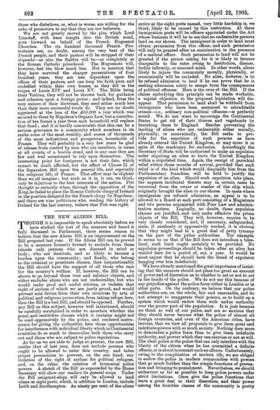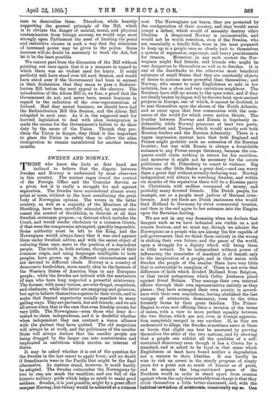THE NEW ALIENS BILL. T HOUGH it is impossible to speak
absolutely before we have studied the text of the measure and heard it fully discussed in Parliament, there seems reason to believe that the new Aliens Bill is an improvement on the Bill proposed last year. If the Aliens Bill can be proved to be a measure honestly devised to exclude from these islands only persons who are diseased in mind or body ; who are destitute, and so likely to become a burden upon the community ; and finally, who belong to the criminal or prostitute classes, then unquestionably the Bill should have the support of all those who care for the country's welfare. If, however, the Bill can be shown to go beyond these wise and salutary objects, and either excludes aliens who are not undesirables, but who would make good and useful citizens, or violates that right of asylum of which we are justly proud, and would prevent men driven from their own countries by acts of political and religious persecution from taking refuge here, then the Bill is a bad Bill, and should be opposed. Further, any Bill on this subject, however well intentioned, should be carefully scrutinised in order to ascertain whether the penal and restrictive clauses which it contains might not be used oppressively by the police, and rendered instru- ments for giving the authorities here those opportunities for interference with individual liberty which in Continental countries do so much to demoralise both those who carry out and those who are subject to police regulations.
As far as we are able to judge at present, the new Bill, unlike that of last year, does not exclude persons who ought to be allowed to enter this country, and takes proper precautions to prevent, on the one hand, any violation of the right of asylum for political refugees, and, on the other, the creation of tyrannical police powers. A sketch of the Bill as expounded by the Home Secretary will show our readers its general scope. Under the Bill emigrant-ships will only be allowed to land aliens at eight ports, which, in addition to London, include Leith and Southampton. As ninety per cent, of the aliens arrive at the eight ports named, very little hardship is, we think, likely to be caused by this restriction. At these immigration ports will be officers appointed under the Act whose business it will be to see that no undesirable persons land on our shores. The immigrant in order to land e mus obtain permission from this officer, and such permission will only be granted after an examination in the presence of a medical officer. Such permission to land will not be granted if the person asking for it is likely to become chargeable to the rates owing to destitution, disease, bodily infirmity, or unsound mind. In other words, aliens likely to injure the community morally, physically, or economically will be excluded. No alien, however, is to be refused admission to land if he can prove that he is seeking admission solely to escape from the consequences of political offences. Here is the crux of the Bill. If the clause embodying this principle can be made workable, a capital objection to the proposed legislation will dis- appear. That permission to land shall be withheld from, immigrants who have been sentenced to extraditable- crimes—i.e., ordinary non-political offences—is perfectly sound. We do not want to encourage the Continental States to get rid of their thieves and vagabonds by banishing them to England. Besides preventing the landing of aliens who are undesirable either morally, physically, or economically, the Bill seeks to pro- vide for the expulsion of such persons as have already entered the United Kingdom, or may enter it in spite of the machinery for exclusion. Accordingly the Secretary of State will be authorised to make an expulsion order requiring an alien to leave the United Kingdom within a stipulated time. Again, the receipt of parochial relief within three months of arrival, provided that such relief is of the kind, which would disqualify him from the Parliamentary franchise, will be held to justify the expulsion of an alien. Should such expulsion take place, the expense incidental thereto may i4 certain cases be recovered from the owner or master of the ship which originally brought the alien to our shores. In cases where immigrants are refused admission, an appeal is to be allowed to a Board at each port consisting of a Magistrate and two persons acquainted with Poor Law and adminis- trative matters. Logically, no doubt, these expulsion clauses are justified, and only make effective the prime objects of the Bill. They will, however, require to be very closely considered, and, if necessary, safeguarded, since, if carelessly or oppressively worked, it is obvious that they might lead to a great deal of petty tyranny on the part of the police authorities. For example, it seems to us that if the Bill does not introduce a time- limit, such limit ought certainly to be provided. No expulsion proceedings should be taken after an alien has resided here for a period of, say, a year. It would be most unjust that he should have the dread of expulsion hanging over him indefinitely.
We have already mentioned the great importance of insist- ing that the measure should not place too great an amount of power and of discretion as to whether to act or not to act in the hands of the police. We do not say this because of any prejudice against the police force either in London or in other ports. On the contrary, we believe that our police authorities are, on the whole, fair and reasonable, and do not attempt to exaggerate their powers, or to build up a system which would endow them with undue authority over the poorer part of the population. It is just because we think so well of our police, and are so anxious that they should never become what the police of almost all foreign countries, and even of the American cities, have become, that we view all proposals to give them great and indefinite powers with so much anxiety. Nothing does more to demoralise a police force than to give them indefinite authority, and powers which they can exercise or not at will. The ideal police is the police that can only interfere with the liberty of the citizen when he has committed a definite offence, or is about to commit such an offence. Unfortunately, owing to the complication of modern life, we are obliged to endow the police in modern communities with powers that go much further than the simple functions of preven- tion and bringing to punishment. Nevertheless, we should_ endeavour as far as possible to keep police powers under strict limitations. Once give the police functions that leave a great deal to their discretion, and their power among the humbler classes of the community is pretty sure to demoralise them. Therefore, while heartily supporting the general principle of the Bill, which is to obviate the danger of mental, moral, and physical contamination from foreign sources, we would urge most strongly upon Parliament the need of limiting the penal and reetrictive clauses in such a way that the minimum of increased power may be given to the police. Some increase will no doubt be necessary to work the Act, but let it be the least possible.
We cannot part from the discussion of the Bill without pointing out once again that it is a measure in regard to which there was no violent need for hurry. It could perfectly well have stood over till next Session, and would have stood over if the Government had been in earnest in their declaration that they mean to pass a Redistri- bution Bill before the next appeal to the electors. The introduction of the Aliens Bill is, we fear, a proof that the Government do not, and never have, meant business in regard to the reduction of the over-representation of Ireland. Had they meant business, we should have had the Redistribution Bill this Session, and the Aliens Bill relegated to next year. As it is, the supposed need for hurried legislation to deal with alien immigration is made the excuse for the Government's failure to do their duty by the cause of the Union. Though they pro- claim the Union in danger, they think it less important to place the Union in safety than to allow the alien immigration to remain unrestricted for another twelve months.



































 Previous page
Previous page